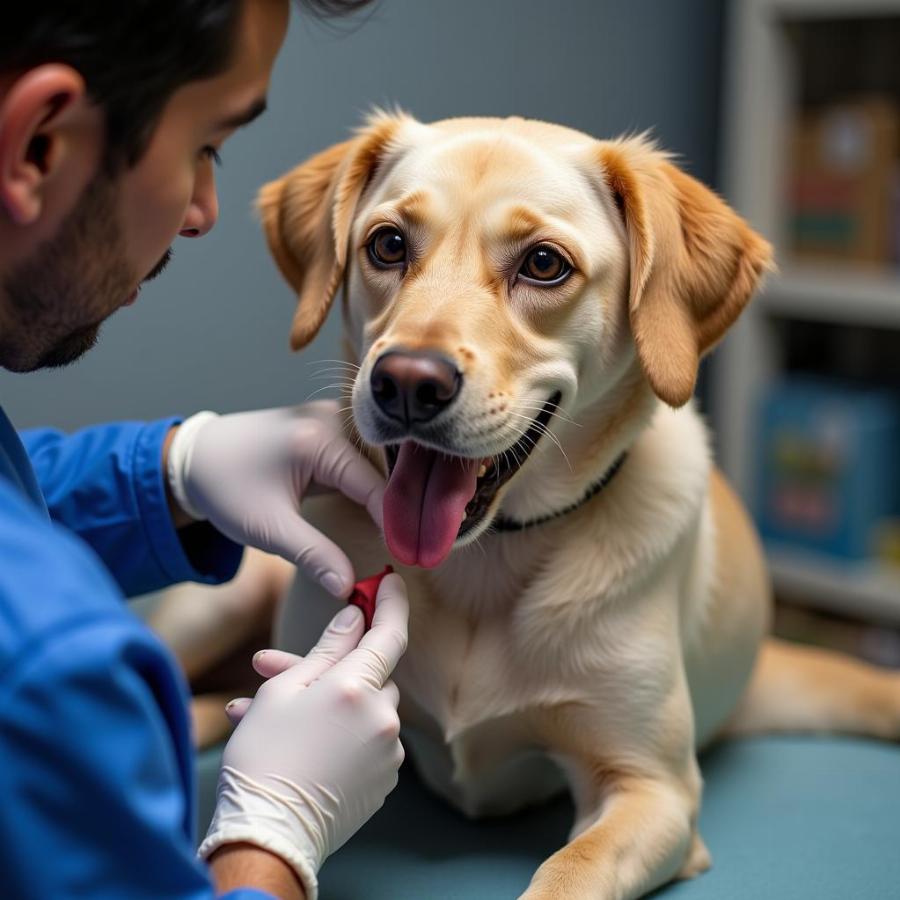A cystotomy in dogs is a surgical procedure that involves opening the bladder. While the term might sound daunting, understanding what a dog cystotomy entails can help alleviate concerns and equip owners with the knowledge to support their furry friends through the process. This comprehensive guide will cover everything you need to know about canine cystotomies, from the reasons behind the procedure to post-operative care.
When is a Dog Cystotomy Necessary?
A cystotomy is performed for a variety of reasons, primarily to address issues within the bladder. Common reasons include:
- Bladder Stones (Uroliths): Surgical removal is often the most effective treatment for large or complex bladder stones that can’t be passed naturally or dissolved with medication.
- Bladder Tumors: Cystotomy allows for biopsy or removal of bladder tumors, aiding in diagnosis and treatment.
- Ectopic Ureters: This congenital abnormality, where the ureters bypass the bladder, often requires surgical correction through a cystotomy. ectopic ureter dog offers further information about this condition.
- Bladder Trauma: Repairing ruptures or tears in the bladder caused by accidents or injuries often necessitates a cystotomy.
- Retrieval of Foreign Objects: Dogs sometimes ingest foreign objects that can become lodged in the bladder, requiring surgical removal.
What to Expect During the Procedure
Before the surgery, your dog will undergo pre-operative blood work and imaging tests (like X-rays or ultrasound) to assess their overall health and pinpoint the problem. The procedure itself is performed under general anesthesia. The surgeon makes an incision in the abdomen to access the bladder, then carefully opens the bladder to address the underlying issue, whether it’s removing stones, tumors, or repairing damage. Once the problem is resolved, the bladder and abdominal incisions are closed with sutures.
Post-Operative Care and Recovery
After the cystotomy, your dog will require careful monitoring and post-operative care. This usually involves:
- Pain Management: Your vet will prescribe pain medication to keep your dog comfortable during recovery.
- Antibiotics: These help prevent infections.
- Bladder Management: Your vet may recommend expressing your dog’s bladder express dog bladder during the initial recovery phase.
- Restricted Activity: Limiting your dog’s activity is crucial to allow the incision to heal properly.
- Follow-up Appointments: Regular check-ups are essential to monitor healing and address any complications.
What are the Potential Complications of Dog Cystotomy?
While cystotomies are generally safe, potential complications can include:
- Infection: Though antibiotics are administered, infections can still occur.
- Urinary Incontinence: Temporary or, in rare cases, permanent leakage of urine can sometimes occur.
- Bladder Stone Recurrence: Depending on the type of stones, they can re-form. Dietary changes may be recommended to prevent this.
- Stricture: Narrowing of the urethra, which can impede urine flow, is a less common complication.
How Much Does a Dog Cystotomy Cost?
The cost of a dog cystotomy varies based on factors like geographic location, the complexity of the procedure, and the dog’s size. It’s best to consult with your veterinarian to get an accurate estimate for your specific situation.
 Bác sĩ thú y kiểm tra chó sau phẫu thuật
Bác sĩ thú y kiểm tra chó sau phẫu thuật
Frequently Asked Questions About Dog Cystotomy
- How long does a dog cystotomy take? The surgery typically takes between one to two hours.
- How long is the recovery period? Most dogs recover within two to three weeks.
- What are the signs of a post-operative infection? Signs include fever, lethargy, loss of appetite, redness or swelling around the incision site, and foul-smelling discharge.
- Can my dog live a normal life after a cystotomy? In most cases, yes. With proper care and follow-up, dogs can typically return to their normal activities.
- What should I feed my dog after a cystotomy? Your veterinarian will likely recommend a special diet to support bladder health and prevent future issues.
Could These Also Be Helpful?
Are you also curious about other canine surgical procedures or crate training tips? Check out our guides on mpl surgery dog and should i cover my dogs crate.
Conclusion
A dog cystotomy is a surgical procedure with various applications in addressing bladder-related problems. Understanding the reasons behind the procedure, what to expect during and after surgery, and potential complications can help pet owners feel more confident and prepared to support their furry companions through the process. Regular communication with your veterinarian is key throughout this journey to ensure the best possible outcome for your dog.
Beaut Dogs is your trusted source for comprehensive and reliable information about the world of canine companions. We offer expert guidance on everything from breed selection to health care, ensuring you have the knowledge to provide the best possible care for your beloved pet. For any further assistance, please contact us via Email at [email protected]. Beaut Dogs is dedicated to helping you navigate the joys and challenges of dog ownership. Visit us at https://beautdogs.com.